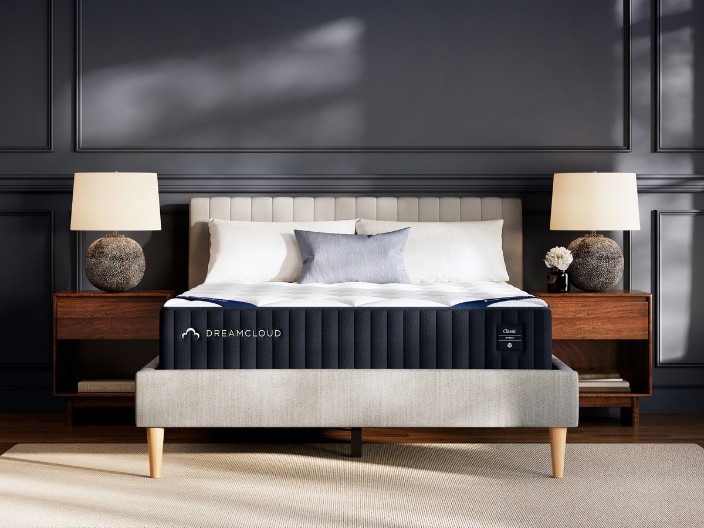How Long Do Mattresses Last?
Share
Fact checked
Reviewed by experts
Updated
December 26, 2022
Quick read
6 mins to read
List of Content
Have you ever wondered how long do mattresses last on which you sleep so peacefully each night? Mattresses start to soften or wear out with time, and in a matter of a few years, you find yourself searching for a new one.
Understanding the mattress type and mattress longevity can help you find the perfect mattress. Fortunately, mattresses have a good lifespan and can last up to a decade. But do you know what factors affect the lifespan of a mattress? And how can you increase its life? Read on to learn more about mattresses, and it’s lifespan.
How Long Should a Mattress Last?
The average lifespan of a mattress is 7-10 years. The built materials, techniques, and sleeping style play a significant role in how long a mattress lasts. It also depends on your usage and the brand.
It is known that mattresses do not come with a written expiration date, but they do have one indeed. It also matters on the individual sleeper when they decide to toss out the mattress. And then some will not find any flaw in the mattress. Maybe it’s the love for the mattress or the habit of sleeping on the same mattress each night.
Now that you know, a mattress won’t last more than a decade. You’ll need to pay close attention to your mattress.
Factors That Affect the Lifespan of a Mattress
Different types of mattresses have different lifespans. Let’s have a quick look at each mattress’s lifespan.
| Mattress Type | Mattress lifespan |
|---|---|
| Innerspring | 5.5 – 6.5 years |
| Foam | 5-7 years |
| Latex | 7.5 – 8.5 years |
| Hybrid | 6.5 – 7.5 years |
| Air | Up to 5 years |
| Water bed | 5-7 years |
Usually, mattresses are made to last, but in some cases, they won’t. Several factors can affect your mattress, and as regular mattress users, you should know which factors affect the lifespan of your mattress.
- Materials
The materials used in creating a mattress will have a larger impact on the longevity and durability of a mattress. Materials like high-quality poly-foam and latex can last longer as compared to cotton. Therefore, you should consider buying a mattress that is made from a durable and strong material.
- Mattress type
It’s no surprise that mattress types can make a lot of difference in affecting the mattress’s longevity. Innerspring, hybrid, foam, gel are different types of mattresses in the market. Latex and memory foam are the most durable mattresses, followed by gel. With the advancement in technology, you’ll find manufacturers creating durable mattresses.
- Quality
Another factor that determines mattress life expectancy is quality. While purchasing a mattress, you should invest in a high-quality mattress as it is not something you buy frequently. Buying a cheap mattress will not be a wise decision. These mattresses tend to wear out soon, and you end up spending more than saving.
- Sleeping positions
How you utilize your mattress also says a lot about your mattress life. Side sleepers, stomach sleepers, and back sleepers need different support and use the same mattress differently. For instance, side sleepers need more support on the hips and shoulders. The more support you use, the quicker the mattress will wear out from that side. This is true for a tough mattress, no matter the quality.
- Mattress care
Another important factor that can let your mattress wear out soon is how you take care of it. Taking good care of your mattress by following a hygienic routine will keep your mattress safe from wear and tear. Make sure you follow a healthy and regular mattress care routine to add life to your mattress.
When to Replace a Mattress?
Wondering how long should you keep a mattress? Usually, after 5-7 years, you should replace your mattress. Mentioned below are the signs you need a new mattress. If you notice any one of them, make sure you keep that in mind and check your mattress from time to time for further issues.
Here are some questions you need to ask yourself regarding your mattress:
- Uncomfortable feeling: Are you comfortable with your mattress? Over some time, the comfort level of your mattress can wear out. If you feel uncomfortable while sleeping on your mattress or feel more comfortable in a hotel mattress or any other mattress, then that’s a clear sign that you need to replace it.
- Duration: Most mattresses start to lose their touch in just a couple of years. If your mattress is over 5 years old, you should pay close attention to its feel. There might be some areas where the mattress might sag or feel uncomfortable. Keep a note of these things before you conclude to change your mattress.
- Improper sleep: Do you feel tired after waking up? Or do you feel like you were tossing and turning all night? These are the signs you need to buy a new mattress. With time a mattress can let you down and might not match up to your expectations.
- Increased body pains: Is your mattress increasing body pains? Is your mattress failing to support your body? If your answer is yes, it is time to toss the old mattress out. Increasing body pains is an indication that the mattress is no longer meeting your needs and is not supporting the body as it should.
- Sagging: If you notice sags in your mattress, then you know it’s too late to continue sleeping on the same mattress. Sagging is a common physical change you’ll notice in your mattress over the years.
- More bedtime disturbances: If you can notice your partner’s movements easily while sleeping or you get disturbed by their movement, don’t get mad at them. It’s the mattress. If you’ve reached this point, then it is better to move ahead and get a brand new mattress.
- More allergic reactions: If your allergic reactions are increasing more than ever, you should consider a new mattress, not a new dermatologist. You know how long is a mattress good for, and with time your mattress can increase skin irritations. Old mattresses usually catch up more dust and allergens, which could increase allergies.
How to Increase the Life of a Mattress
Once you are habitual of using a mattress, use it to last forever. Well, we all know that cannot be the case as mattresses expire at any time. That doesn’t mean there is nothing that you can do to prolong the life of your mattress. Sure are some of the tips and tricks you can follow to add life to your mattress.
- Keep your mattress protected
Everybody knows how hard it is to keep the mattress clean and free from stains. A popular way to save the mattress from unwonted stains is to use a mattress protector. This covers your mattress and adds a protective layer against dirt stains and dust.
- Keep it squeaky clean
Keeping things in order is a good habit. Even the tiniest crumb can invite bugs and pests into your bed. For that reason, you should always keep your mattress as clean as possible. A good way would be to vacuum it every few months to avoid any dust settling down thoroughly.
- Flip or rotate your mattress
It is important to prevent damages, to keep your mattress intact. Many mattresses can be flipped or rotated without compromising comfort. You, too, can flip or rotate your mattress once every three months to keep your mattress good as new.
- Set ground rules
You know how long a bed lasts. What you can do is, set some ground rules around your bed. You can increase your mattress’s lifespan by refraining unnecessary pressure on your mattress. This includes jumping on the bed or placing heavy objects unnecessarily on the mattress.
The Final Word
Now that you know how long a mattress lasts, you should accept the fact that one day, it will get replaced. The best you can do is to handle a mattress with care to delay the inevitable.
The important thing here is to notice the early signs of wear and tear and any discomfort after lying down. If you are keen to notice any of these issues, you might be able to pay more attention to your mattress, and when The time comes, you choose a new one.
FAQs
It is rare that a mattress can last up to 20 years. Some mattresses can last for such long durations if you take really good care of them.
Every 5-7 years. Although mattresses have different types, and each has a different lifespan, the average lifespan of a mattress is around 6-7 years. So, it would help if you got them replaced after that, for sure.
About 4-7 years. Pillow tops wear out soon as they sit on top of the mattress. They usually need replacing as their coils wear out soon, and they can become flat with time.
Latex mattresses are more durable than others. These mattresses can last up to 8 years and still give you the comfort you need. Make sure you buy high-quality latex mattresses and mattress protectors to make them last longer.
Here are some steps you can take to stop your mattress from sinking in the middle:
- Use a mattress topper or protector
- Rotate the mattress often
- Use an extra pillow for support
- Change the foundation often
- Find a well-balanced bed to support the mattress
- Take advantage of the warranty and get it replaced if you can.
This website does not offer medical advice nor professional medical services; rather, it is provided solely for educational, informational, and/or entertainment purposes. Individuals seeking medical advice should consult a licensed physician. The information provided should not be used for diagnosis or treatment of any condition, disease, or injury. When you have a medical condition, you should always talk to licensed doctor or other certified medical professional. You should never delay seeking professional medical advice or treatment based on the contents of this website. Call 911 or immediately go to the nearest emergency room if you think you may have a medical emergency. The contents of this website are provided “as-is”, Sleep Authority and its parent, subsidiaries, affiliates, employees, contributors disclaim any warranty of the information contained herein. Please contact using contact form to report any errors, omissions, misinformation, or abuse.
Sleep Authority is brought to you by Resident, the company that brings you Nectar, DreamCloud, Awara, Wovenly, Bundle, Home Well Designed and Level Sleep.




